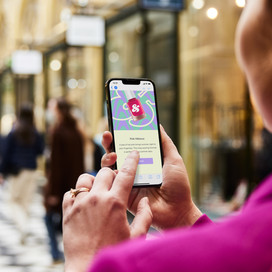Table of contents
Some shoppers enter a store or log on to the computer with a specific plan in mind. Other consumers take a more relaxed approach, browsing window displays or multiple websites and trusting the “perfect gift” to stand out. And when it does, these shoppers snatch it up.
This is an impulse buyer. For many of us, 2020 and its many limitations have made us more impulsive shoppers than we ever were. Through a large portion of the year, we’ve gone without the in-person experiences, dining and entertainment we might usually enjoy. It has left a gap in our calendars and in our wallets. So it’s not without reason that in the last week of April, more than two million parcels a day were delivered through Australia Post. That’s a 90% increase on last year’s deliveries.
An impulse buy is one that’s not premeditated. When a shopper sees something and buys it to solve for a want or need, that is considered impulsive or instinctual. These shoppers are open to purchasing goods or services that they didn’t specifically have in mind. Knowing how to capture their attention can make a big difference in growing your sales this festive season and beyond.
Understanding the impulse shopper
The characteristics of an impulse shopper are primarily related to how easily they purchase items. Product research isn’t going to be top of mind. But the desire to spend, and the potential to save, is.
The ease and convenience of being able to shop directly from a mobile device is a major factor in fuelling impulse buying. Paypal’s 2019 mobile commerce report found that more than half of Australian consumers used their mobile devices at least weekly to purchase items and make payments. Younger shoppers lead the way with 32% of Gen Z shoppers making a mobile purchase at least daily.
They’re quick to make a purchase decision. When looking for indicators of impulsive shopping behaviour online, consult your website analytics. Ironically, a returning customer’s online behaviour appears very similar to a first-time impulse shopper: Look for quick, decisive navigation to items and a short time-to-purchase. The difference is the segmentation of first-time visitors.
How to meet an impulse shopper’s expectations
Making checkout a breeze is the best way to make sure these shoppers simply can’t say no.
Optimise their experience for usability. The most influential website qualities for impulse online purchase decisions are ease of use, usefulness, and entertainment, according to MarMara University. For eCommerce stores, optimising for ease of use and usefulness translates into product discoverability and a more seamless checkout experience.
Remove obstacles for online shoppers with straightforward product organisation, easy-to-find buttons to “add to cart,” and a simple checkout flow. Take it even further by offering payment options that are built for speedy checkout, such as Apple Pay or Google Pay.
Gamify shopping. Incorporate a game or quiz to determine the type of discount or other promotion they’ll receive when they buy right away. This is even easier through eCommerce than in a brick-and-mortar store because it can happen in the form of a newsletter, a pop-up on the website or a game that appears during checkout. This will get the attention of the impulse buyer. Gamifying visitors’ shopping experiences can also be a way to drive entertainment value and overall customer experience.
Give them a deal. Promote flash sales, deal-of-the-day specials and “last chance” discounts to these opportunistic buyers. Keep in mind that many shoppers plan their shopping around specific sale events like the Boxing Day sales.
Impulse shoppers may still plan when they’re looking to buy, but the surprise is in what they’ll buy, especially if it’s something they perceive to be a good deal. Highlighting your sales, deals, and special buys on social media and through newsletters is a great way to let customers know about bargains.
Nearly half of consumers are spending more time on social media during the COVID-19 pandemic, according to a recent consumer survey by GlobalData, making it an optimal channel to promote these deals.
Offer a great return policy. Contrary to myths, there is no evidence of convenient eCommerce experiences leading to high return rates. In fact, the average Australia shopper is $384 out of pocket each year due to not getting around to returning unwanted items that they bought. Regardless of how many returns you’re seeing, offering a fair and accommodating returns policy will promote goodwill and trust with your customers.
In the time of COVID-19, this has become more important, because people often don’t get to try something out in person before they buy it. Post a clear return policy on your site to get ahead of any doubts impulse shoppers might have, taking care to highlight any special return policy changes you have implemented during the pandemic.
How to catch the attention of an impulse buyer
Once you’ve appealed to an impulse shopper’s sense of enjoyment and urgency, reassure them by establishing your credibility. Then, begin the process of cultivating a relationship beyond the impulsive sale.
Emphasise self care. For so many Australians locked down in their homes and local areas through much of 2020, buying something impulsively during the pandemic has provided a welcome mood-boost. You can catch an impulse buyer’s eye by putting an emphasis on treating themselves during these trying times.
Streamline the purchasing process. Remove friction and build trust for them at this point with the comfort of warranties, money-back guarantees, customer ratings and any other risk-reversal visuals you have. Another way to smooth time-to-purchase at this stage is by offering a guest checkout option, so first-timer shoppers don’t have to create an account with your site.
Go beyond season’s greetings. Once you’ve met and converted a seasonal impulse shopper, plan to stay in touch. This usually begins with your transaction confirmation email. “Good choice” or “Your thoughtful gifts are on the way” can bolster buyers who may be having second thoughts. Send additional notifications that reinforce post-purchase rationalisation and allow them to enjoy the excitement of their seasonal score.
Give great customer care. As customers await their goods, consider sending an email with creative ways other customers have presented your products to gift recipients. Use messaging that affirms them and their choices, not your brand.
You can also remind them of upcoming gift-giving events like birthdays, anniversaries, and other holidays, and you should be top of mind when they need the perfect, quick solution. With everyone’s attention being pulled in so many different directions lately, reminding customers about your products and what they might be used for can help them feel like you have their back.
Reaching Impulse-Shopper Checklist
- Offer sales and specials to make decisions easier.
- Simplify checkout to prevent abandoned shopping carts.
- Gamify shopping to make the experience fun.
- Create a sense of urgency to encourage purchases.
- Adopt an easy return policy to reduce purchasing concerns.
- Emphasise self care.
- Deploy top-notch customer service to drive return visits.
Smaller retailers have the perfect opportunity to create a customer experience that impulse shoppers can’t resist. By tapping into their energy and making the purchasing process simple, you can satisfy this shopper’s need for instant gratification, and make it fun. Once you’ve captured their attention and helped raise their spirits, they will remember you as a trustworthy resource the next time they need quality gift ideas in a hurry.
![]()











